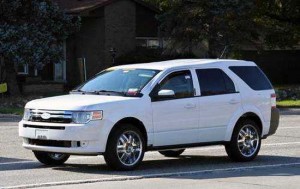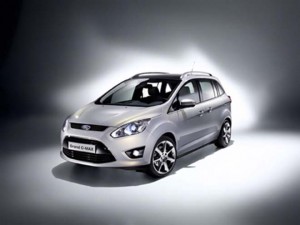
With the 2011 Ford Explorer, the long-popular SUV switches to a crossover-based design. Photo Courtesy Brenda Priddu & Co.
Following up on hints offered earlier in the month, Ford Motor Co. officials have announced they’ll be adding 1,200 new jobs at an assembly plant on the outskirts of Chicago.
Already building the latest version of the Taurus sedan, Ford’s Chicago Assembly Plant will also begin producing the maker’s next-generation Explorer sport-utility vehicle, a move that will require a $400 million investment. About half that money will go into the assembly plant and a nearby stamping facility. The rest will go towards engineering and launch-related costs.
Long the most popular SUV on the U.S. market, with sales peaking at 445,000 annually, Ford has seen the Explorer slip sharply, in recent years, however. The brand was clearly hurt by a problem with tire failures, early in the last decade, but it was also hammered by increased competition, poor gas mileage, harsh ride, questionable quality and a steady shift in consumer tastes away from conventional truck-based utes to car-based crossovers. In 2009, Explorer sales slipped 35%, from year-earlier levels, to just 52,190.
The “all-new” version of the SUV, which appears to be a repackaging of the Freestyle and then the Taurus X built in Chicago until last year, will go into production late this year. Explorer will follow, rather than lead, in at least one key area. The 2011 Ford Explorer will abandon its body-on-frame design and adopt a crossover design, sharing the same platform used for the latest version of Taurus.
(Ford isn’t the only automaker to make such a dramatic shift. The original Mercedes-Benz M-Class was truck-based, but the latest version is a car-derived crossover.)

Ford will produce the U.S. version of the C-Max "people mover," most likely at the Kentucky plant that used to build the Explorer.
The approach is expected to result in better fuel economy, as well as improved ride and handling, though it is also likely to reduce Explorer’s towing capacity and off-road capabilities. The maker is betting that the benefits will significantly outweight the disadvantages and take advantage of the steady growth of the crossover segment – which is now nearly twice the size of the conventional SUV market.
The decision to shift the design meant Explorer could no longer be assembled at the company’s truck plant, in Louisville, Kentucky. But Louisville will be undergoing big changes itself. The factory will be converted to produce an as yet-unspecified small vehicle based on the global “C” platform used for the 2011 Ford Focus sedan and hatchback.
The C platform is already shared by a number of models Ford sells in Europe and other parts of the world. That includes the C-Max, a compact “people mover” Ford has confirmed it will begin offering in the U.S., in a couple years.
Ford is in the midst of a major realignment of its global product line-up, part of CEO Alan Mulally’s so-called “One Ford” strategy. A key goal is to reduce product duplication – and the inherent development costs – by sharing vehicles and platforms around the world.
